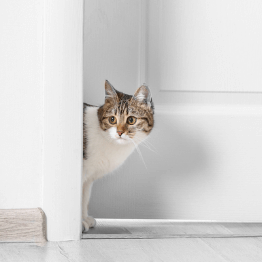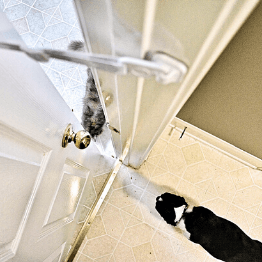VACCINATING YOUR PETS: A COMPREHENSIVE
GUIDE TO PET VACCINES
By: Door Buddy Editors | Published: October 31, 2023
As responsible ‘pawrents’, we all want to ensure that our furry friends live long, healthy lives. One of the most ‘im-paw-tant’ ways to achieve this is through pet vaccines. Vaccines protect our pets from various infectious diseases, some of which can be life-threatening. But what exactly are these pet vaccines, and why are they so essential?
In this comprehensive guide, we’ll be exploring core and non-core vaccines, schedules, side effects, and more. By understanding the importance of vaccinating your furbabies, you’ll be able to make informed decisions for their well-being and overall health.
‘IM-PAW-TANT’ INSIGHTS WHEN VACCINATING YOUR PET

Vaccinations are essential for protecting pets from preventable diseases and maintaining optimal health.
To create a customized vaccination plan, veterinarians can advise on additional vaccines based on our pets' lifestyle, environment, and location.
Vaccination schedules should be determined in consultation with a veterinarian. Understanding potential reactions is also important for proper monitoring of a pet’s condition.
ESSENTIAL VACCINES FOR PETS
Vaccines play a key role in safeguarding our beloved pets from numerous contagious, preventable diseases. They are categorized into core and non-core vaccines.
Core vaccines are a must for all pets. This is because they can protect them from a range of serious diseases, which could also be passed on to people. Non-core vaccines, on the other paw, may be recommended depending on your pet’s lifestyle or geographical area.
Vaccines work by activating the body’s immune system to recognize and combat a specific microorganism. They consist of either killed or altered microorganisms that, once introduced to the body, stimulate the immune system to produce a defense against the disease.
The preventative nature of pet vaccines makes them indispensable. Optimal pet health can be maintained by administering the appropriate core and non-core vaccines.

Vaccines play a key role in safeguarding our beloved pets from numerous contagious, preventable diseases. They are categorized into core and non-core vaccines.
Core vaccines are a must for all pets. This is because they can protect them from a range of serious diseases, which could also be passed on to people. Non-core vaccines, on the other paw, may be recommended depending on your pet’s lifestyle or geographical area.
Vaccines work by activating the body’s immune system to recognize and combat a specific microorganism. They consist of either killed or altered microorganisms that, once introduced to the body, stimulate the immune system to produce a defense against the disease.
The preventative nature of pet vaccines makes them indispensable. Optimal pet health can be maintained by administering the appropriate core and non-core vaccines.
CORE VACCINES FOR DOGS

Core vaccines for dogs in the USA include:
Distemper
Parvo
Adenovirus
-
Rabies
These vaccines, including canine influenza vaccines, provide protection against diseases that can spread quickly and have serious consequences, such as severe illness and death.
The DAP vaccine, for example, is a combination vaccine designed to protect our doggos against distemper, adenovirus (infectious canine hepatitis), and parvovirus. Canine distemper is an extremely infectious sickness amongst unvaccinated dogs. It can bring about severe neurological difficulties, pneumonia, fever, and even encephalitis. If proper checks and cures are not done in time, it can even lead to death.
So, how often should your pup get vaccinated? Vaccination schedules for dogs should be determined with your veterinarian, considering factors such as your dog’s age, size, breed, and environment.
Adult dogs typically receive DAP and rabies vaccinations every 3 years. Adherence to the recommended schedule for core vaccines can shield your dog from life-threatening diseases and contribute to their overall health.
Core Vaccines for Cats in the USA include:
Feline panleukopenia
Feline herpesvirus
Feline calicivirus
Rabies
These vaccines offer protection against highly contagious viral diseases that can affect cats of all ages and lead to serious health issues such as respiratory infections, eye infections, and even death. For example, feline panleukopenia, also known as feline distemper, caused by the feline parvovirus, is a highly contagious disease that can be fatal if not treated promptly.
Your kitty's long-term health and well-being hinge on them getting the necessary core vaccines. A veterinarian-recommended vaccination schedule can aid in warding off preventable infectious diseases and preserving your cat’s health. We want our fur babies to enjoy all nine lives, right?!
ADDITIONAL VACCINES BASED ON LIFESTYLE AND LOCATION

Aside from core vaccines, certain pets may require additional vaccines based on their lifestyle, environment, and geographical location. These non-core vaccines provide extra protection against diseases that your furbabies may be more likely to encounter in their environment or due to their specific lifestyle.
Your veterinarian's role is super 'im-paw-tant' in determining the appropriateness of these additional vaccines for your pet. By assessing your pet's lifestyle, location, and potential exposure to diseases, the vet crafts a vaccination plan ‘purrrfectly’ tailored to meet your pet's needs.
Some examples of situations that may require non-core vaccines include:
Regular exposure to doggy daycare, dog parks, boarding or grooming facilities
Traveling
Hiking or spending time in wilderness areas
Regular contact with bodies of water
In these cases, it may be necessary to consult with your vet to determine which non-core vaccines are recommended for your pet.
Non-core Dog Vaccines
Non-core vaccines for dogs may be recommended based on lifestyle and location and include:
Bordetella
Canine influenza
Leptospirosis
Lyme disease
For example, the Bordetella vaccine offers protection against kennel cough, a highly contagious respiratory disease in dogs. When determining which non-core vaccines are appropriate for your dog, factors such as geographic location and risk of disease in the area, your pet’s exposure to certain environments, and their overall health should be considered. Discussing your dog’s needs with your veterinarian will guarantee the administration of necessary vaccines to avert potential health risks.
Non-core Cat Vaccines in the USA include:
Feline leukemia
Feline immunodeficiency virus
-
Feline infectious peritonitis
The feline leukemia vaccine, for instance, is recommended for cats at risk of exposure to the feline leukemia virus, such as those that go outdoors or live in multi-cat households.
Consulting with your veterinarian is crucial when considering non-core vaccines for your kitty. The decision should be informed by factors like your cat’s lifestyle, environment, and potential disease exposure. This ensures the necessary protection against preventable health risks for your fur baby.
VACCINATION SCHEDULES FOR PETS



Vaccination schedules for pets vary depending on factors such as age, medical history, and lifestyle and should be determined in consultation with a vet.
These schedules play a vital role in maintaining your pet’s health by ensuring it receives the necessary vaccines at the appropriate times and intervals. Proper vaccination helps protect pets from a variety of diseases, some of which can be life-threatening.
Staying up-to-date with your pet’s vaccinations as per your vet’s recommendations is fundamental. This helps safeguard them from infectious diseases and promotes a long, healthy life. Following AAHA guidelines from the American Animal Hospital Association can ensure your pet receives the best care possible.
Puppy Vaccination Schedule
Puppy vaccination schedules typically involve multiple doses given every 2-4 weeks until the puppies reach 16 weeks of age.
This is because it is difficult to ascertain when a puppy has lost the passive protection it receives from its mother, as strong maternal immunity can interfere with early vaccination. The first dose serves as a priming dose, while the second dose enhances the response to a higher, more enduring level of immunity.
Following a puppy vaccination schedule ensures your puppy receives the necessary protection against life-threatening diseases at the right time. By consulting with your veterinarian and adhering to the recommended schedule, you can help protect your puppy’s health throughout their early development.
Kitten Vaccination Schedule
Kitten vaccination schedules involve multiple doses given every 3-4 weeks until 16 weeks old.
Like puppies, kittens receive temporary immunity from their mothers, which gradually declines over the first few weeks of life. This maternal immunity can interfere with early vaccination, making it necessary to administer multiple doses to ensure adequate protection.
Following your vet’s recommended vaccination schedule for kittens ensures their protection from infectious diseases during their early development. This adherence is vital for your kitten’s overall health and well-being.
Adult Pet Vaccination Schedule
Adult pet vaccination schedules include regular boosters for core and non-core vaccines, with core vaccines typically given every 3 years and non-core vaccines given annually or as needed. The frequency of booster vaccines depends on various factors, such as your pet’s age, medical history, and lifestyle.
Adherence to your vet’s recommended adult pet vaccination schedule facilitates continued protection from infectious diseases throughout your pet’s life. Regular vaccinations are crucial to maintaining your furbaby's overall health and well-being.
UNDERSTANDING VACCINE REACTIONS AND SIDE EFFECTS

‘Pawrents’ should be aware of potential vaccine reactions and side effects ranging from mild to severe.
Mild reactions, such as soreness at the injection site, fever, and lethargy, are common and typically resolve on their own within a day or two. However, more severe reactions, although rare, can occur and may require immediate veterinary attention.
Understanding potential reactions and side effects of pet vaccines helps to monitor your pet’s condition post-vaccination and take necessary action. Should your pet experience any unusual symptoms following vaccination, consulting with your vet is vital. Let's take a closer look at the reactions!
Common Mild Reactions may include:
Lethargy
Mild discomfort
A low-grade fever
General feelings of unease
-
Soreness at the vaccination site caused by the injection itself, resulting in pain and tenderness.
Post-vaccination, close monitoring of your pet is necessary, and your veterinarian should be contacted if signs persist beyond 24 hours. Although mild reactions are usually not worrisome, monitoring your pet’s condition and seeking professional advice when needed is super ‘im-paw-tant’.
Severe Allergic Reactions
Severe allergic reactions to pet vaccines are rare but can be life-threatening, requiring immediate veterinary attention. Signs of a severe allergic reaction to a pet vaccine may include:
Facial swelling
Diarrhea
Itchiness
Hives
Vomiting
-
Difficulty breathing
Certain breeds of dogs and cats, such as Dachshunds, Pugs, Boston Terriers, Miniature Pinschers, and Chihuahuas, may be more prone to severe vaccine reactions.
If your pet shows symptoms of a severe allergic reaction post-vaccination, immediate veterinary care is crucial. Swift action can facilitate necessary treatment and reduce the risk of life-threatening complications.
THE ROLE OF MATERNAL IMMUNITY IN PET VACCINATION
Legal requirements for pet vaccinations vary by location, with most states requiring proof of rabies vaccination for both dogs and cats aged 4 months and older. Compliance with these regulations is crucial to ensure the well-being of your pet and the community and avoid fines and penalties.
Familiarization with and adherence to the legal requirements for pet vaccinations in your area is important. Compliance includes obtaining a veterinarian-signed rabies vaccine certificate and ensuring your pet receives any additional mandatory vaccinations. These measures help protect your pet and others from infectious diseases.
Maternal immunity plays a role in pet vaccination, with newborn pets relying on temporary maternal antibodies for protection against infectious diseases. These maternal antibodies are acquired through the mother’s milk and provide passive immunity for the first few weeks of life.
However, maternal immunity gradually declines over time, making it necessary to start with vaccinations at an appropriate age to ensure our pets are always protected.
Comprehending the role of maternal immunity in pet vaccination is vital for the timely administration of necessary protection against infectious diseases. Following a veterinarian-recommended vaccination schedule helps protect your pet’s health during the critical early stages of development.

LEGAL REQUIREMENTS AND COMPLIANCE FOR PET VACCINATIONS
Legal requirements for pet vaccinations vary by location, with most states requiring proof of rabies vaccination for both dogs and cats aged 4 months and older. Compliance with these regulations is crucial to ensure the well-being of your pet and the community and avoid fines and penalties.
Familiarization with and adherence to the legal requirements for pet vaccinations in your area is important. Compliance includes obtaining a veterinarian-signed rabies vaccine certificate and ensuring your pet receives any additional mandatory vaccinations. These measures help protect your pet and others from infectious diseases.
THE COST OF PET VACCINES
The cost of pet vaccines can range from $15 to $100, depending on the type of vaccine. Local humane societies may offer low-cost or free vaccine clinics to help make these important vaccinations more accessible and affordable for pet owners.
The cost of core vaccines for dogs and cats can also vary, with prices generally ranging from $20 to $230 for dogs and $20 to $40 for cats.
Though pet vaccine costs may seem intimidating, their vital role in protecting your pet from infectious diseases and maintaining overall health should not be forgotten. An investment in your pet’s vaccinations contributes to their long-term well-being and can preclude potentially costly future medical treatments.
CONCLUSION: VACCINATING YOUR PETS

Vaccinating pets is crucial for protecting them from infectious diseases and helps promote a long, healthy life. Vaccines activate the immune system to recognize and combat specific microorganisms, providing a high level of protection in most cases. Timely administration of the appropriate vaccines ensures your pet’s protection from potentially severe illnesses.
In conclusion, vaccines play a vital role in safeguarding our pets from a variety of contagious, preventable diseases. A clear understanding of the importance of pet vaccination and close collaboration with your vet to devise a tailored vaccination plan can safeguard the health and well-being of your furry friends for the foreseeable future.
FREQUENTLY ASKED QUESTIONS
What is the difference between core and non-core vaccines?
Core vaccines are essential for all pets to protect them from common, serious illnesses, while non-core vaccines may be recommended depending on the pet's environment and lifestyle.
How often should core vaccines be administered to adult pets?
Core vaccines should be administered to adult pets regularly, with a recommended frequency every 3 years. Be sure to follow the advice of your veterinarian for the best results.
What are some common mild reactions to pet vaccines?
Common mild reactions to pet vaccines may include lethargy, mild discomfort, a low-grade fever, and general feelings of unease.
What are the legal requirements for pet vaccinations in the US?
In the US, legal requirements for pet vaccinations vary from state to state but typically include rabies vaccination for dogs, cats, and ferrets aged 4 months or older.
What is the cost range of pet vaccines?
Pet vaccines can range from $15 to $100, with local humane societies often providing low-cost or free options.




